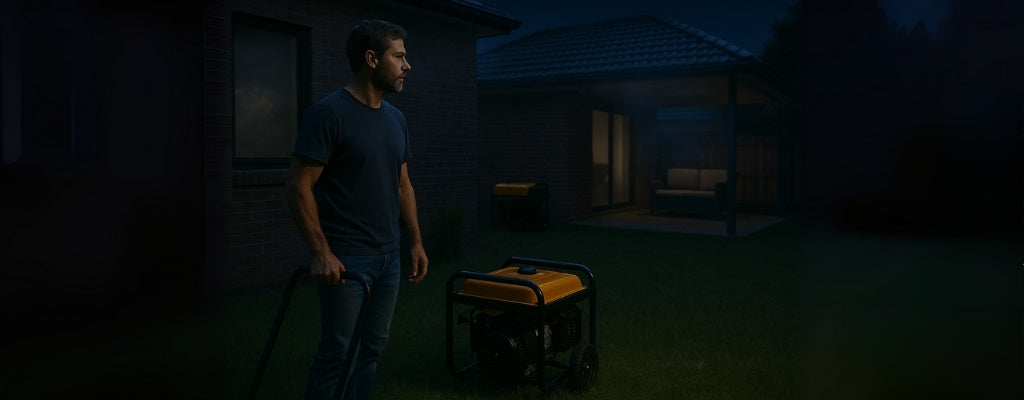
Where Is the Best Place to Put a Generator?
When the power’s out and the BBQ’s on hold, your generator needs a smarter spot than next to the kids’ trampoline. Short answer: Outside, on level ground, away from doors, windows, and vents. Want to avoid fumes, fines, and fried circuits? Keep reading for safety tips and pro placement advice.

Placing a Generator Outside: Safety First
Picking the right place for your generator isn’t just about convenience — it’s about safety, performance, and following the rules.
Generator Distance from House and Code Requirements
Your generator should sit at least 1.5 metres (or 5 feet) from your home — especially windows, doors, and vents. That helps stop carbon monoxide from sneaking indoors and putting your household at risk.
Aussie building codes may also require at least 1 metre clearance from overhangs and 3 metres from anything flammable. Always double-check with your local council. Getting this wrong isn’t just risky — it could land you with fines or worse.

Where Is the Best Place to Put a Generator in the House?
Here’s the deal — it’s almost never safe to run a generator indoors. Garages, enclosed patios, or sheds might seem like a good idea, but they trap carbon monoxide.
In rare cases where indoor placement is necessary, like in commercial setups, you’ll need professional ventilation systems, CO detectors, and strict compliance with installation codes. For most homes, it’s just not worth the risk.
Protecting Your Generator in All Weather Conditions
Whether it’s bucketing down or scorching hot, your generator needs weather protection. Moisture and debris can damage your gear and pose serious hazards.
A proper generator tent, canopy, or weatherproof enclosure is a smart investment. These let your generator breathe while keeping out rain, dust, and leaves. Just don’t toss a tarp over it — that traps heat and can lead to fire.

Placement for Different Generator Types
Not all generators are the same, and neither are their ideal homes.
Where Is the Best Place to Put a Whole House Generator?
Whole house generators are hardwired into your home and meant to stay put. That means choosing their location carefully is key.
They should sit outside on a concrete pad — away from foot traffic, windows, and sleeping areas. You’ll want easy access for maintenance and fuel delivery, plus a direct line to the switchboard.
Keep in mind, these units aren’t whisper quiet. Place it too close to the bedroom and you might be trading blackout stress for sleep deprivation.

How to Safely Connect and Store Your Generator
Whether it’s a beefy backup unit or a portable powerhouse, your generator needs a safe setup. Use a transfer switch — it keeps your home safe and prevents dangerous backfeeding.
When not in use, store your generator somewhere dry, secure, and well-ventilated. A clean shed or weatherproof box works well. If you’ve got a portable model, empty the fuel tank before long-term storage and top up the battery now and then.
Whatever you do, don’t shove it in the back corner of a damp shed under a bunch of junk — that’s how you end up with rust, rats, and regret.
You might also like:
- How Do You Keep a Portable Generator Dry?
- Can I Use a Generator to Power My House in Australia?
-
How to Use a Generator During a Power Outage in Australia?
-
What Should a Generator Sit On?
-
What Should You Not Plug Into a Generator?
-
Where Can I Put My Generator?
- Can Generators Be Installed in Basements?


